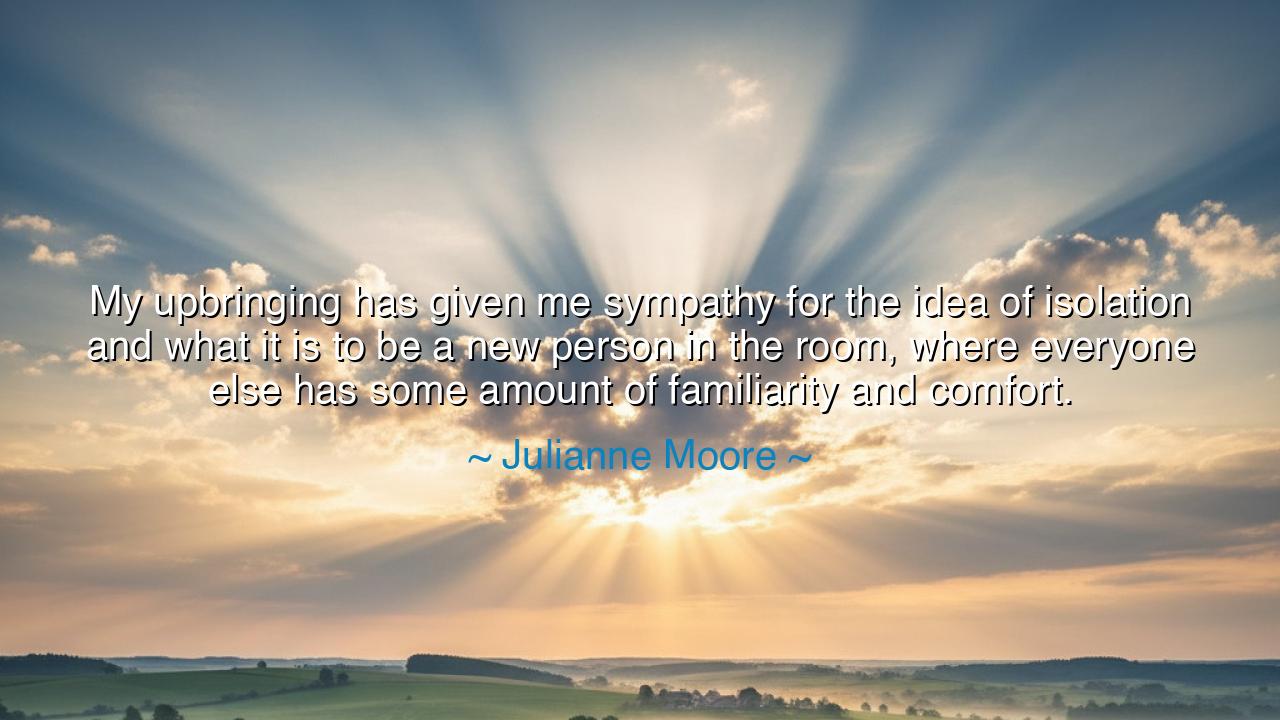
My upbringing has given me sympathy for the idea of isolation
My upbringing has given me sympathy for the idea of isolation and what it is to be a new person in the room, where everyone else has some amount of familiarity and comfort.






When Julianne Moore confessed, “My upbringing has given me sympathy for the idea of isolation and what it is to be a new person in the room, where everyone else has some amount of familiarity and comfort,” she revealed a truth that speaks not only of her own life but of a universal human condition. To be the stranger, the newcomer, is an experience that leaves its mark on the heart. It breeds in those who endure it not only resilience, but also a deepened compassion for others who find themselves in the same place of vulnerability. Her words remind us that isolation can be both wound and teacher.
The essence of her statement lies in this: those who grow up on the margins, who enter again and again into rooms where bonds are already formed, develop a unique form of sympathy. For they learn what it is to be unseen, to carry the weight of uncertainty, to wrestle with the fear of exclusion. This lived knowledge becomes a seed of empathy, enabling them to recognize and comfort others in similar solitude. Moore’s upbringing—marked by movement and dislocation—became the soil in which this understanding was cultivated.
History is rich with examples of how the outsider’s perspective creates wisdom. Consider Moses, raised in Pharaoh’s palace though born of Hebrew blood. He lived between worlds, never fully at home in either. Yet it was precisely this estrangement that shaped his calling, enabling him to lead his people out of bondage, for he knew the pain of not belonging. In his isolation, he gained vision; in his estrangement, he gained sympathy for the oppressed. Moore’s words echo this ancient pattern: that displacement can sharpen the heart for compassion.
We must also remember that the new person in the room is not merely a symbol but a lived reality in countless lives—immigrants entering foreign lands, children changing schools, workers stepping into unfamiliar workplaces. Their isolation is real, their fear often unspoken. To recognize this is to awaken to our responsibility: to see the unseen, to welcome the outsider, to extend the hand that transforms a room of strangers into a place of belonging.
The lesson, O children of tomorrow, is this: when you find yourself in comfort among the familiar, do not forget the one who stands uncertain at the threshold. To you it may be a small act—a smile, a word, a gesture—but to them it is the opening of a door, the dissolving of their loneliness. And if you are the one in isolation, remember that your struggle can be a wellspring of strength. The discomfort you endure can be transmuted into compassion that will one day heal others.
Practical action lies before you: in every gathering, seek out the newcomer. Do not cling only to your familiar circle, but look for the face that hovers on the edge. Offer them not pity, but recognition, inclusion, and warmth. And in your own moments of estrangement, remind yourself that you are not diminished; you are being formed into one who knows how to see what others overlook. This is a hard gift, but a gift nonetheless.
Therefore, let Moore’s words endure as a gentle command: honor the isolated, for they carry wisdom. Recognize the new person, for you too were once new. And let your own moments of estrangement teach you not bitterness, but a sympathy that expands your heart. For in this, you will find the strength not only to endure isolation, but to transform it into a well of compassion for the generations that follow.






AAdministratorAdministrator
Welcome, honored guests. Please leave a comment, we will respond soon